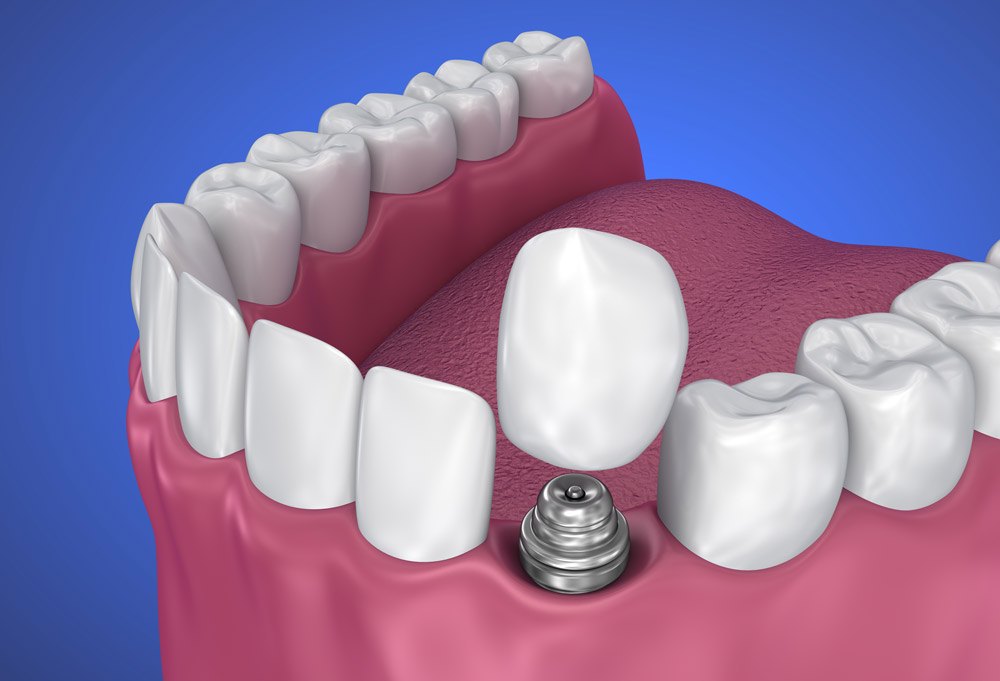Dental Implants Gosford

What is a dental implant?
Dental implants are artificial teeth or prostheses that are inserted in place of one or more missing natural teeth, or even the whole set. A metal ‘root’ is inserted into the jawbone and bonds with the existing bone; an artificial tooth known as a ‘crown’ is then attached to the root via a connecting piece (‘abutment’).
Dental implants are surrounded by natural bone and gum tissue and are generally considered a better alternative to dentures or tooth supported bridges, especially if the surrounding teeth may already be weakened by large fillings or previous disease of the ligaments and jaw bone.
Are dental implants safe and how long do they last?
Placing implants is surgery and there are always inherent risks with any surgery. However, it is still a very safe procedure when planned and placed meticulously.
Dental care for implanted teeth is much the same as for natural teeth and, if properly maintained, implants can last for many years. However, if neglected, implants can be affected by plaque and gum infections even more so than natural teeth due to their delicate bond with the gum tissues.
Who is not suitable for dental implants?
Implants are not suitable for everyone. They are not recommended for children under 17 years, heavy smokers, people with active tooth decay or gum disease, pregnant women (due to the need for anaesthesia in surgery), people with some medical conditions or those with certain physical or psychological illnesses that will prevent proper healing or understanding of maintenance requirements.
What happens before I get a dental implant?
Prior to implant placement surgery, your dentist will perform a comprehensive dental examination, which may also include photographs, x-ray images, a referral to obtain a low dose cone-beam CT scan and a digital mouth scan or impressions for dental casts.
It is important to tell your dentist your entire medical history before surgery, including medicines you are currently taking, history of bone disease, like osteoporosis, any known surgery/anaesthesia related problems, or if you are prone to heavy bleeding.
Existing dental health problems, such as decay or gum disease, will need to be treated before surgery. The size and shape of your implants will be decided upon based on the remaining natural teeth—discuss your expectations with your dentist beforehand to ensure you are not disappointed, remembering that your implants may not look or feel exactly like your natural teeth.
What is involved and how many visits?
On average, from start to finish there may be 1-2 consultation appointments, and around 3 treatment stages. The first treatment involves the implant surgery visit, performed under local anaesthetic, with or without happy gas if you choose, or IV sedation administered by an anaesthetist who attends for your surgery appointment. Your dentist will discuss all this with you at the planning stage. At the surgery visit, the metal root is inserted into the jawbone. This is allowed to heal for up to three months before the abutment is fitted. Lastly, the crown is screwed or cemented onto the abutment.
Do implants hurt?
Placement of the implant is done with anaesthesia, just like removing a tooth. There is actually less post-operative pain than removing a tooth!
What happens after implant surgery?
After surgery time off work may be recommended for complex cases. If you had your implant placement procedure under IV sedation, you will not be able to drive and will need a chaperone.
It is not uncommon to experience some swelling, bruising or pain after the surgery, however these symptoms should settle within a week to two weeks—icepacks and painkillers as recommended by the dentist can help manage this.
Antibiotics may be prescribed before and after your surgery. No alcohol or hard foods should be consumed for a few days.


